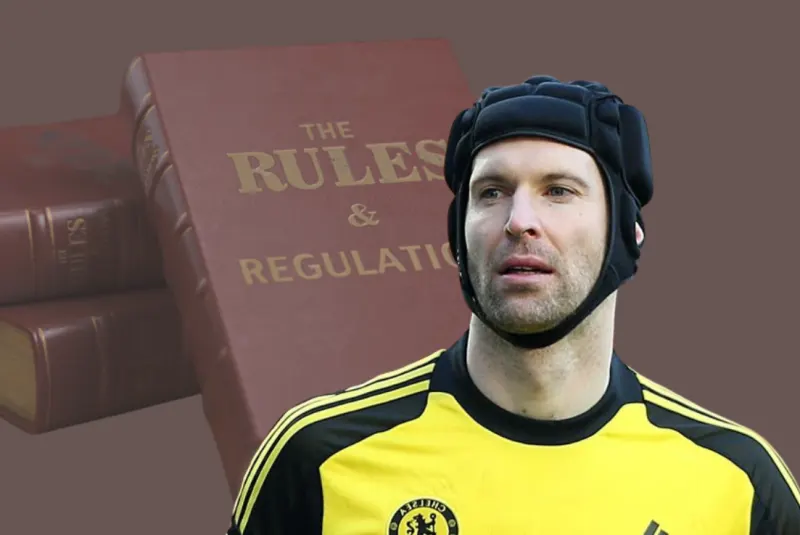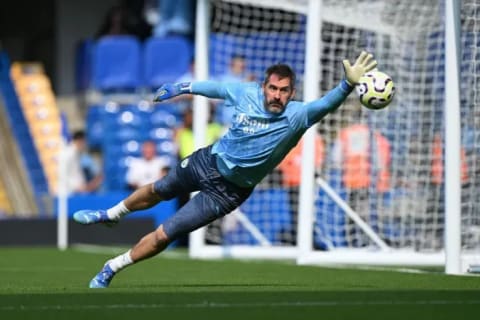The legal position of the number one has evolved over the last 100 years…
A goalkeeper’s privileges have always been something of an anomaly within the rulebook.
“Why are we trying to stop goals?,” Gary Lineker exclaimed on the latest Match of the Day after Arsenal’s late equaliser at Villa Park was ruled out for a handball by Kai Havertz. Emilio Martinez celebrated the decision with the fans as if it was a goal for the home side.
Even within the existence of a 21st-century handbook that minimises their status, the goalkeeper needs to wring every bit of celebration out of a situation. They have so often been an afterthought within the legalese of the beautiful game.
It was Martinez’s antics in the 2022 World Cup final penalty shootout that provoked this significant withdrawal of for goalkeepers in the newly drawn IFAB regulations. The 31-year-old’s gamesmanship in Qatar, using “every trick in the book” as Hugo Lloris claimed, was unsavoury but hardly new. Goalkeepers do things to put off penalty-takers. It’s the least they can do to take some control against overwhelming odds.
Since the beginning of July, the new penalty regulations state ‘the goalkeeper must not behave in a way that unfairly distracts the kicker, e.g. delay the taking of the kick or touch the goalposts, crossbar or goal net.’ The Argentinian himself was sanguine about the changes, but France’s Mike Maignan sarcastically tweeted ‘New IFAB penalty rules 2026: Goalkeepers must have their backs to the shot. If the penalty is saved, the opposition gets an indirect free-kick.’
Traditionally, the long eagle has to swoop and anticipate just to have a chance. They don’t need a lead weight.
"How is any goalkeeper supposed to cover an area of 7m and 32cm by 2m and 44cm without any foot movement while the players shoot from 12 yards with (an) average speed of 70 mph which takes the ball 0.35 seconds to cross the goal line is beyond my understanding,” blasted Petr Cech. Lukasz Fabianski had just been penalised for coming millimetres off his line against Leeds in 2020.
Cech’s interpretation didn’t quite reflect the rule introduced at the 2019 Women’s World Cup which demanded that the goalkeeper must have at least part of one foot on the goal line when the kick is taken. However, as the former United States women’s World Cup winner Hope Solo pointed out, there is little or no advantage for a ‘keeper just to merely step forward to cut down the angle. Unless you are Jerzy Dudek in the 2005 Champions League final.
Those were the days.
In his excellent book, The Outsider: A History of The Goalkeeper, Jonathan Wilson writes: ‘If football represents an elaborate fertility rite….by scoring a goal….then logically the role of goalkeeper… was an aberration; he was the man whose job was to stop the rite being fulfilled.’
In some ways, the laws have followed that narrative by alienating the stopper. Tacticians assume they are not even a player in a formation - there are only ten that 'count'. It’s a mindset that has driven the idea that custodians are beings from another planet. Needs often get scoffed at or overlooked.
If goalkeepers are mad, or different, or a misunderstood minority, then the rules sure like to cement or even ignore their status as unregistered participants. Up until 1871, the role of the goalkeeper was not even specified in the statute books. Ultimately any player could morph into the goalkeeper if they were ‘last man back.’
The FA finally amended the laws to fully recognise the goalkeeper, and, crucially, that only he was allowed to handle the ball 'for the protection of his goal.' They even got a coloured jersey in 1909. Believe it or not, goalkeepers were permitted to pick the ball up and roam anywhere in their own half until 1912. Then they were put back in their box to shut up shop.
There’s an unspoken – no, spoken – overview that goalkeepers get special dispensation. A potted review of how things were ‘back in the day’ would shock those so dismissive of players being penalised merely for touching the number one. Up until the mid -1930s, goalkeepers had hellfire to contend with as opponents, by laws of the game, by fair means or foul, were allowed to hack the ball out of the hands.
It took the death of Sunderland’s Jimmy Thorpe in a game against Chelsea in 1936 to provide the first real stamp of true security. The 22-year-old was hospitalised and eventually passed away after he had been repeatedly kicked on his side, chest and head despite having full control. A match report recorded: “Only when Sunderland defenders intervened was Thorpe rescued.”
The law was rewritten to ban any raising of the foot or using a kick to relieve the ball from a goalkeeper’s arms. Such conduct would be deemed violent.
And yet there are still grey and shady areas to laws that exist to this day. In theory, a goalkeeper cannot be challenged by an opponent when in control of the ball with his hands. However, like a rugby scrum or within a melee, the application of such a rule is very subjective or distorted by a moving blur of bodies. When a ‘keeper comes off the worst for wear when pouncing on a loose ball, courage is no protection from calamity.
After Cech and Carlo Cudicini both suffered head injuries in a match against Reading in 2006, the Italian was furious when the head of the PFA suggested that protective headgear could be an answer: “Instead of demanding action against those who so violently challenge the ‘keepers, they want to dress us up like ice hockey netminders", he retorted.
The truth remains that just as the goalkeeper’s skillset is being expanded into a far more creative and connected one on the pitch, the rule book is now telling them to behave like automatons. The six-second clock-watchers could be the next big thing. Timewasters…
Goalkeepers are different when the laws pick on them.








